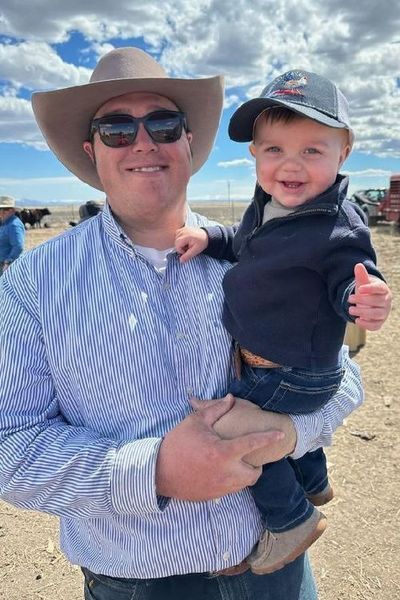Travis Hatley, Rangeland Management Specialist with the Bureau of Land Management

Travis Hatley with his son Hardy at a spring branding at Lawen, OR.
Since 2012 while still finishing his undergraduate degree in Rangeland Management and Ecology, Travis has worked with the BLM, first as a Range Technician and now as a Rangeland Management Specialist [aka Range Con]. He works closely with private landowners who have grazing allotments on public land managed by the Bureau of Land Management.
“The year is fairly cyclic. In late winter through spring we are meeting with permittees to set up grazing rotations for the year. As those get set and completed then we start getting out on the ground doing allotment inspections, trend monitoring and project maintenance throughout late spring and summer. Late summer and fall brings on allotment utilization to make sure we aren’t under or over utilizing areas, so we can best manage whatever resource objectives we have set forth. Late fall and winter is for recap, getting NEPA [National Environmental Policy Act] and other paperwork addressed, and we start the process over. In between all this we try to handle any projects that arise, wildland fires that occur within our areas, collaborative meetings/projects, and anything else that is thrown our way”.
Harney County has always been home to Travis. He returned to the area post graduation and values the ability to work in and around the county he had the privilege of growing up in. His family ties historically stem into the Drewsey valley and he appreciates working with the many families and landowners who once knew his own family relations. When speaking about the permittees he works with around the Stinkingwater area, he notes, "Everyone out there, we work really well together."
Travis grew up doing construction, then started building fence and working for some of the land resource agencies in Harney County during high school; that's how he made his way into working in the natural resource field, earning his degree and working with the BLM. "I like working with the permittees and having some influence and benefit to the ground. Working with the local ranchers and making a difference out there is the best part of it. [I'm able] to travel all around the county and they (the landowners) see me out there and I know what's happening on the ground and that makes it easier to make plans, make positive differences, and changes for the better."
Travis also participates with the Harney County Wildfire Collaborative, bringing to the table valuable perspectives about the land and what private landowners who are leasing land are seeing. It's incredibly valuable to have relationships with the landowners that are out there every day, watching what’s going on, and it’s equally as valuable for Travis to be out in the field gathering his own perspective. "I have been there since the big fires happened and I know that ground. Knowing where various resources are at, knowing where the problem areas typically are and also where things are good, is always a plus." This perspective that Travis brings to collaborative conversations helps toward deciding what wildfire resilience tools or combination of them are beneficial for a landscape.
Between his work as a range con, doing some construction work here and there and running he and his wife’s own small bunch of cows, Travis stays plenty busy. Travis will spend the spring helping to calve, summer he gets in some team roping and he loves to fish and hunt in the fall along with snowmobiling in the winter. "Anything outside for the most part."

